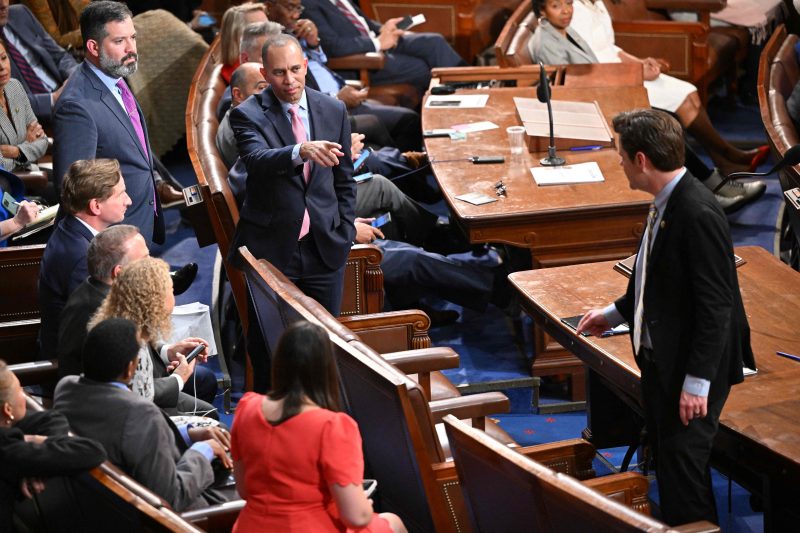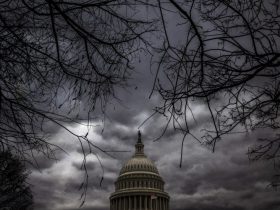Thanks to Republicans’ potential inability to elect a speaker with their members’ votes alone, Democrats may have a golden opportunity to shape the next two years in the House.
The question is: At what point will they actually try to do something with it?
Democrats have largely played it cool when it comes to the possibility of striking some kind of bipartisan deal. This scenario has mostly been floated by Republican allies of would-be speaker Kevin McCarthy (R-Calif.), and mostly in the service of warning the Freedom Caucus against going too far.
The threat is that if the holdouts won’t comply, they might leave other Republicans with no choice but to go across the aisle. And at that point, the resulting speaker might be less conservative, Democrats could attain more power, and McCarthy’s concessions to the Freedom Caucus probably would be off the table.
It still seems unlikely; even the most moderate of House Republicans have all kinds of incentive to try just about everything else first. But it’s also possible that with a very narrow House and only four or five GOP votes to spare, getting a speaker with Republican votes alone could prove unattainable — either because the Freedom Caucus holdouts won’t budge or because getting them on board would require a level of concessions that goes too far for enough McCarthy allies.
(McCarthy gained votes in the 12th round of balloting on Friday, but he’s still confronting a potentially prohibitive bloc of Republicans who say they’ll never vote for him. Seven of his most hard-line critics voted against him.)
Democrats appear content, for now, to refrain from feeding into the McCarthy allies’ nightmare scenario and to allow the GOP to flounder.
One of the few Democrats talking openly about this is Ro Khanna (Calif.). He suggested that Democrats could join with Republicans to elect someone in the mold of Pennsylvania’s Brian Fitzpatrick — arguably the most moderate House Republican — Republican Mike Gallagher (Wis.) or Republican David Joyce (Ohio). But he said Republicans would need to agree not to have standoffs over the debt ceiling or threaten to shut down the government, and he wanted some kind of deal on subpoena power.
Democrat Marcy Kaptur (Ohio), who comes from a swing district, has even suggested that Democrats might help McCarthy get elected, if the terms are agreeable.
Others, though, are not so keen on talking about this — at least publicly.
“I don’t see us helping them. I think they need to help themselves, and I think they need to do their damn jobs,” Democrat Jamaal Bowman (N.Y.) told Politico. “I mean, what the hell? You were sent here to govern. What is this?”
Democrat Jason Crow (Colo.) said Thursday that there were no circumstances in which he would vote for even a Republican moderate as speaker.
Democrat Elissa Slotkin (Mich.), though, pointed to what the lack of public enthusiasm for cutting a deal might be about: gaining leverage over Republicans.
“They’re not desperate enough yet,” she told Politico.
“Yet” is the operative word here. Democrats have reason to play their intentions close to the vest. For one, talking about the possibility openly and making it seem more plausible could inject some urgency into the GOP conference to figure out its problems. And anyway, this probably could happen only when Republicans have exhausted their options — so why not wait it out and make a handful of Republicans more “desperate” to cut a deal?
But it would be political malpractice for Democrats not to at least privately entertain this eventuality.
As things stand, McCarthy or any other speaker elected only by Republicans would almost surely be agreeing to concessions that would significantly empower the Freedom Caucus to gum up the works. Even if we shouldn’t expect a GOP-controlled House and a Democratic-controlled Senate to come together to pass a lot of major new legislation in the next two years, there are things Congress has to pass. Democrats could use this opportunity to extract an agreement that would guard against a government shutdown or a potential default on our nation’s debt brought on by a debt ceiling showdown.
And, even aside from whatever rules the chamber adopted, a speaker elected only with GOP votes would have to constantly mind that right flank. If Democrats do have any hope of passing major new legislation, it would definitely be better to have a speaker less beholden to that wing. (Congress over the past two years has shown some ability to pass bipartisan legislation, after all.)
Beyond that, Democrats could gain concessions that could hamstring GOP efforts to launch investigations on matters like Hunter Biden. This is what Khanna is pointing to when he says he wants a deal on subpoena power.
It’s too simple to say this could lead to some new, great era of bipartisan legislating — that we could truly see some kind of coalition government. But Democrats have plenty to gain, even by helping elect a Republican speaker. We might not get to that point any time soon — or at all — but the longer the process drags on, the more difficult it will be to avoid.








